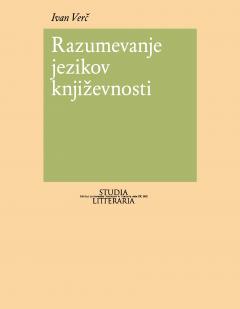Razumevanje jezikov književnosti
This monograph discusses the status of contemporary literary studies, which faces new challenges under the Bologna university reform. It is divided into two parts: one theoretical and one applied.
Literary studies are not merely a methodological textbook meant to show the way to the true meaning of a work of art, but also an attempt to understand human existence within a language. Literature is the space in which the possibilities of this existence are put into effect to the maximum extent. The common denominator is the practice of modal utterance or the relationship between the uttered content and the speaker’s perception of reality. Various modalities are often interconnected and frequently further build upon one another. From medieval literature to postmodernism, the relationship between the utterance and reality was rarely unambiguous; however, the modalities of the relationship are iterative in nature and can, thus, also be observed from the point of view of literary studies. The basic modalities of the verbal categories of necessity (the imperative), possibility (the conditional), and reality (the indicative) determine the differences between literary periods and the differences in the human relationship with the word. The “hard" twentieth-century literary studies (e.g., formalism, structuralism, and semiotics) discovered the recurrent elements of the relationship and explained their recurrent mechanisms. These findings, based on a rigorous analysis of literary texts, also maintain their value for the younger “Bologna" generation. Despite the interpretational “shipwreck," it is important even for this generation to become aware of its responsible existence within the language in the multitude of communication options. The freedom and ability to listen are as important as the freedom and ability to speak. University lectures can provide more concrete answers to the theoretical questions posed.
The second part of the monograph focuses on utterance modality in Russian literature with special emphasis on realism. Even at the beginning of his creative career, Fyodor Dostoyevsky drew attention to the problematic nature of this relationship. He distanced himself from the illusory nature of the direct relationship between the reality of actual existence in its own right and the reality of its description. When the great Russian novel exhausted its articulation potential, the issue of “real" representation possibilities switched to the issue of the implicit boundaries of representation itself. The monograph analyzes the transcendence of “mimesis" in three Russian writers (Leonid Leonov, Boris Pilnyak, and Andrei Platonov), who observed reality primarily from the viewpoint of its linguistic construct. The issue of language, which outlines reality itself, is characteristic of both avant-garde movements and Soviet literature. In twentieth-century Russia, the possibilities of various linguistic modalities escalated into open conflict between the alleged reality of actual existence and the equally alleged reality of its articulation.
Downloads

Series
License

This work is licensed under a Creative Commons Attribution-NonCommercial-NoDerivatives 4.0 International License.
